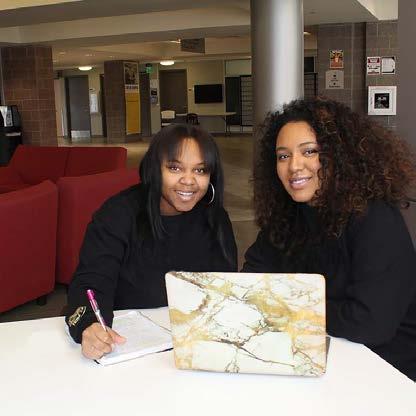



The Quad presents information to help you along your journey to SUCCESS.
We believe if you prepare and plan, you can expect to progress along your path to SUCCESS.





The Quad presents information to help you along your journey to SUCCESS.
We believe if you prepare and plan, you can expect to progress along your path to SUCCESS.
Davenport University davenport.edu
Eastern Michigan University emich.edu
Davenport Univ.
Grand Valley State University gvsu.edu
davenport.edu
Eastern Michigan University emich.edu
Macomb Community College macomb.edu
Davenport Univ.
Davenport Univ.
Grand Valley State Univ. gvsu.edu/next
Oakland Community College occ.edu
Eastern Michigan University
Davenport Univ. davenport.edu
Henry Ford College hfcc.edu/apply
Eastern Michigan University emich.edu
Grand Valley State Univ.
Davenport Univ. davenport.edu
davenport.edu
Eastern Michigan University emich.edu
Henry Ford College
Davenport Univ. davenport.edu
Lawrence Tech University admissions@ltu.edu
Oakland University oakland.edu
Eastern Michigan University emich.edu
Macomb Community College macomb.edu
Davenport Univ. davenport.edu
Eastern Michigan University emich.edu
Grand Valley State Univ. gvsu.edu/next Henry Ford College hfcc.edu/apply
Grand Valley State Univ. gvsu.edu/next
Eastern Michigan University emich.edu
Grand Valley State Univ. gvsu.edu/next
Grand Valley State Univ. gvsu.edu/next
Lawrence Tech University
Oakland Community College occ.edu
Henry Ford College hfcc.edu/apply
Schoolcraft College schoolcraft.edu
Grand Valley State Univ. gvsu.edu/next
Henry Ford College hfcc.edu/apply
Henry Ford College hfcc.edu/apply
Macomb Community College
Lawrence Tech University admissions@ltu.edu
Oakland Community College
Oakland University oakland.edu
Macomb Community College macomb.edu
Lawrence Tech University admissions@ltu.edu
Henry Ford College hfcc.edu/apply
Lawrence Tech University admissions@ltu.edu
Lawrence Tech University admissions@ltu.edu
Oakland Community College occ.edu
Macomb Community College macomb.edu
Oakland University
University of Detroit Mercy admissions@udmercy.edu
Schoolcraft College schoolcraft.edu
Lawrence Tech University admissions@ltu.edu
Macomb Community College macomb.edu
Macomb Community College macomb.edu
Oakland Community College occ.edu
Oakland Community College occ.edu
Wayne State University
Macomb Community College macomb.edu
Oakland Community College occ.edu
Oakland University oakland.edu
Oakland Community College occ.edu
Oakland University oakland.edu
Schoolcraft College
Oakland University oakland.edu
Schoolcraft College
Univ. of Detroit Mercy admissions@udmercy.ed
Oakland University oakland.edu
Wayne State Univ.
Schoolcraft College schoolcraft.edu
Univ. of Detroit Mercy
Univ. of Detroit Mercy
Schoolcraft College schoolcraft.edu
Oakland University oakland.edu
Schoolcraft College schoolcraft.edu
Wayne State Univ.
Wayne State Univ.
Univ. of Michigan
Western Michigan University
Schoolcraft College schoolcraft.edu
Univ. of Michigan
Univ. of Detroit Mercy admissions@udmercy.ed Univ. of Michigan goblueguarantee@umich.edu
Wayne State Univ.
Wayne State Univ.


Western Michigan University



Wayne State Univ.
Western Michigan University
Whether your student is new to college or not sure what to do next in life–count on us to help!
Western Michigan University Educational Institutions
Wayne State Univ.
Univ. of Michigan goblueguarantee@umich.edu
Univ. of Detroit Mercy admissions@udmercy.ed Univ. of Michigan goblueguarantee@umich.edu
Univ. of Detroit Mercy admissions@udmercy.ed Univ. of Michigan goblueguarantee@umich.edu
Thank you to our community supporters – See the current employment opportunities
Whether your student is new to college or not sure what to do next in life–count on us to help!
Univ. of Detroit Mercy admissions@udmercy.ed
Western Michigan University

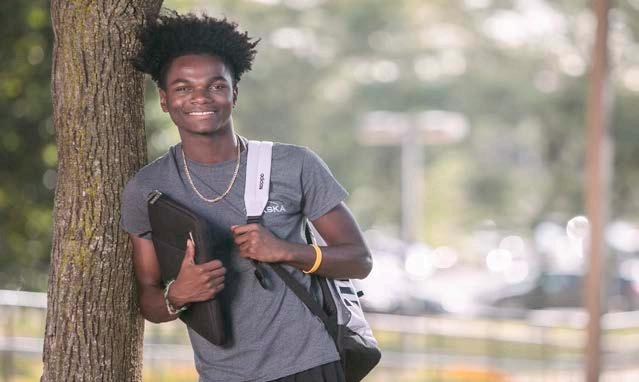


• Passionate and
Univ. of Michigan goblueguarantee@umich.edu
Detroit At Work detroitatwork.com






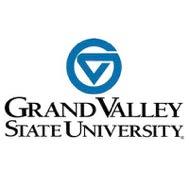


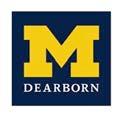

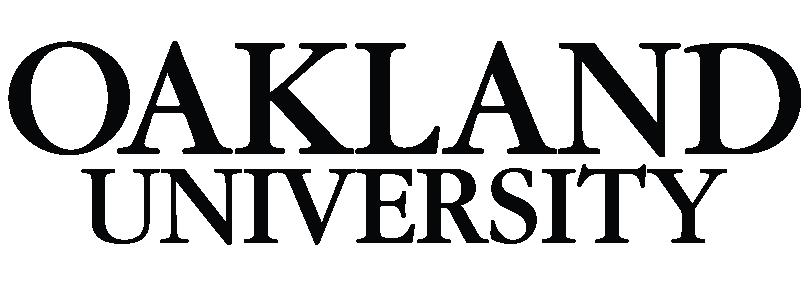



• Passionate and personable instructors



• Career pathways ranging from business to health to skilled trades
• Over 100 career–oriented degrees and certificates
• Career pathways ranging from business to health to skilled trades
• Over 100 career–oriented degrees and certificates
Wayne County waynecounty.com
Michigan Dept. of Labor and Economic Opportunity Whether






And your investment goes far at Macomb. Over 80% of our students leave debt free.
Students can apply, register and pay later for spring/summer, fall and winter semesters now!
Detroit at Work Focus:Hope Michigan Dept. of Labor and Economic Opportunity Oakland Community Health Network Wayne County Human Resources
And your investment goes far at Macomb. Over 80% of our students leave debt free.
Students can apply, register and pay later for spring/summer, fall and winter semesters now!
Students can apply, register and pay later for spring/summer, fall and winter semesters now!


Ready to help your student advance?
Ready to help your student advance?
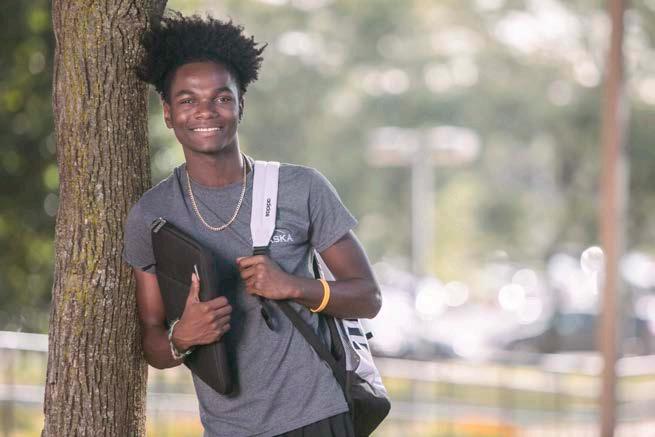
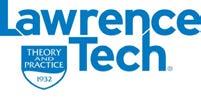



Learn more at macomb.edu/parents



































• Career pathways
Students can apply, spring/summer, fall

Students can spring/summer,
Over 100 career–oriented Ready to help Learn more And your investment Over 80% of our students
• Over 100 career–oriented Ready to Learn And your investment Over 80% of












Success is measured differently in many instances and in many countries. Money is not always what determines success.
Athletes earn trophies, awards, rings to show their success – their wins.
Real estate investors measure land acquisitions and house sales as their success. Entrepreneurs might measure their success by their bottom line/net profit.
Students might measure success by the grades and then the ultimate diploma or certification.
The point is, everyone has a different concept of success and what their success looks like.
However you measure success, it is a personal journey. You are searching, working for, building and climbing to get where you want to be in life.
Some might say, success is making a living, earning wages doing whatever you love to do.
Success is achieving whatever goals you set for yourself. We wish you success at whatever you choose to do. Only you know what you want and what it takes to get there.
The Quad wants to help you consider apprenticeship/ training, formal education and employment. We wish you much – SUCCESS!
---Linda Moragne
Proper Preparation Drives Success
Michigan Wants to Keep You Here –Keeping Talent At Home
Breaking Down Pathways to A Doctorate Degree
Mark Your Calendar – Upcoming Events
Career Success Without College
S.W.A.G. Awards – Scholarships for Michigan Students


CREDITS - ACKNOWLEDGEMENTS
Project Manager
Linda Moragne
Graphic Designer
Juan Sifuentes
Editorial Staff
Ebony JJ Curry
Amber Ogden
Donald James
Special Contributor
Willie Brake
By Ebony JJ Curry Senior Reporter
As the final bell of high school life tolls, students and their guardians stand on the precipice of a new chapter. This transition, filled with aspirations and uncertainties, demands a concerted effort toward Preparation, opportunity, commitment, and success. For Black students, this journey holds unique challenges and triumphs, underscoring the need for a tailored approach to post-secondary readiness.
The Foundation: Preparation
Preparation is the bedrock of future achievements. It involves a thorough exploration of interests, strengths, and career aspirations. Parents and students should engage in open dialogues about potential paths, be it college, vocational training, or entrepreneurship. Researching institutions that support Black students through scholarships, mentorship programs, and inclusive policies is crucial.
High school counselors play a pivotal role in this phase, offering insights into college prep courses, SAT/ACT preparation, and application timelines. For Black students, seeking out historically black colleges and universities (HBCUs) or institutions with strong diversity and inclusion initiatives can provide a nurturing environment that celebrates cultural heritage while fostering academic and personal growth.
Tameka Gaddis, a counselor at Plymouth High School in Canton, brings a wealth of experience and insight into the realm of education. With a bachelor’s degree in biology from Eastern Michigan University earned in 1997 and a master’s degree in School Counseling from Central Michigan University obtained in 2011, Gaddis’s journey from a science teacher to a school counselor has been marked by her dedication to fostering student success across various school districts in the Detroit Metro area. Her transition from teaching science on both the westside and eastside of Detroit to guiding students through their academic and personal challenges as a counselor underscores her multifaceted understanding of the educational landscape.
Drawing on her 25 years of experience in education, Gaddis emphasizes, “Preparation is instrumental to success in higher education. Working in the education field for the last 25 years, I have seen many students with the goal of obtaining a degree from a 4-year university or 2-year college. In order to reach this goal, students must first be prepared for the road ahead academically, financially, and most importantly, socially and emotionally. A college degree is much more than academics. Many people tend to only think of academics when speaking of higher education. While academics is important and certainly the center of the higher education degree, the financial, social, and emotional aspects play a major role as well.”
The Strategic Importance of Scholarships Scholarships are invaluable in mitigating the financial barriers that often deter talented students from
pursuing higher education. For Black students, the pursuit of scholarships is not merely a financial necessity but a strategic endeavor to access quality education and professional opportunities without the looming burden of student debt. Scholarships can range from merit-based awards, which recognize academic, athletic, or artistic talent, to need-based scholarships that aim to make education accessible to students from lower-income backgrounds. Specialized scholarships also exist to support students from minority groups, including those specifically designed for Black students, such as those offered by the UNCF or the Ron Brown Scholar Program.
Navigating Standardized Test Scores
Standardized test scores, such as the SAT and ACT, remain significant components of college admissions despite the growing trend of test-optional policies. Achieving competitive scores can enhance a student’s application and expand their scholarship opportunities. This is particularly pertinent for Black students, who often face systemic challenges in education that can impact test performance. Addressing these disparities requires access to quality test preparation resources, including tutoring, practice tests, and prep courses, which can help level the playing field.
The Role of Commitment
Commitment is the fuel that drives the journey towards success. It means setting goals, staying disciplined, and overcoming obstacles. For Black students, this includes navigating systemic barriers and disproving stereotypes. Cultivating a strong support system of family, mentors, and peers who understand and share these experiences is vital.
Parents can foster commitment by setting high expectations, encouraging resilience, and celebrating every milestone. It’s also important to have honest conversations about the challenges of racism and discrimination, equipping students with the tools to advocate for themselves and others.
“So how can students prepare? It begins early in life, but even if a student gets a late start success is still obtainable,” Gaddis stated. “Having a support team or “village” that supports student’s dreams and goals is a great way to help handle the stresses of college and be successful.”
Navigating the financial landscape of higher education presents both opportunities and challenges for students and their families. Pell Grants, a cornerstone of federal financial aid, offers need-based assistance to the most financially vulnerable students, alleviating some of the financial strain of college expenses. However, while Pell Grants provide crucial support, they often cover only a fraction of the total cost of attendance, leaving a significant financial gap. Viewing education as a long-term investment, parents and students are faced with tough decisions regarding the costs and potential debts incurred through student loans. This investment in education is widely regarded as a pathway to better career prospects and higher
lifetime earnings, underscoring the transformative power of higher education. Yet, the aftermath of this investment can be daunting, with many graduates navigating the complexities of loan repayment in an uncertain job market. The reality underscores the importance of informed financial planning and the pursuit of scholarships and grants to minimize debt, ensuring that the pursuit of higher education remains a viable investment in a brighter future.
Success is not a destination but a continuous journey. It’s about leveraging one’s education and experiences to make a meaningful impact. For Black graduates, this can mean contributing to their communities, breaking new ground in their chosen fields, and mentoring the next generation.
Parents and students should define success on their own terms, recognizing that it may take various forms. Celebrating the achievements of Black alumni and role models can provide inspiration and a sense of possibility.
Participation in extracurriculars, securing internships, and building a strong network are pivotal elements in shaping a student’s personal growth and career readiness. These activities not only enhance a student’s appeal to colleges but also cultivate critical life skills, including leadership, collaboration, and analytical thinking. For Black students, engaging with organizations such as the National Society of Black Engineers (NSBE) and initiatives by the Thurgood Marshall College Fund can open doors to mentorship, career guidance, and financial support in industries where representation is needed.
Moreover, the significance of attending college fairs and sessions tailored for minority students cannot be overstated. These platforms provide invaluable insights into the support structures, academic offerings, and community life of various institutions, empowering students to make choices that align with their aspirations and values.
As parents and high school graduates, particularly those from the Black community, navigate the postsecondary landscape, remember that Preparation paves the way for opportunities, commitment fuels the journey, and success is a testament to resilience and determination. By embracing these steps, students can transition from high school with confidence, ready to carve out their own paths of success in a world full of possibilities.
“I advise students to take interest inventories, to help them get an idea of the career(s) that best suits them,” said Gaddis. “Take classes that pertain to that career as much as possible in school. Volunteer, if you can, with someone in that career field. Apply for summer programs at local universities. Begin looking for scholarships well before 12th grade. Keep your “village” close.
When Ivan Thomas graduated from Warren Lincoln High School in 2019, he wasn’t sure what career he wanted to pursue. What he did know was that he loved good food and homemade cooking, both of which were inspired by his grandmother.
Like many other students who have turned passions into professions, Thomas transformed his love of cooking into a career by earning a degree in Culinary Arts at Macomb Community College. In the process of earning his degree, Thomas was able to participate in a once-in-a-lifetime learning opportunity by studying cooking in Italy through Macomb’s Study Abroad program. “I never knew going to school would open up so many opportunities,” he said.

Business, Information Technology and Culinary Arts
Students interested in Culinary Arts like Thomas should consider attending Macomb’s “Health, Business & Information Technology” spotlight event in which Culinary Arts and other programs will be highlighted.
At this in-person event, which is set for April 8 from 7 to 8:30 p.m. at Macomb’s Center Campus in Clinton Township, participants will have the chance to talk to faculty and staff and learn more about each program and careers. Tours of the high-tech information technology area, Macomb’s teaching kitchens, computer labs, classrooms and more will be the highlight of the event.
Additionally, Macomb is offering other spotlight events for students interested in different career paths, including the following:
Engineering and Advanced Technology
Hear about exciting engineering and advanced technology programs and careers at Macomb on March 13 from 7 to 8:30 p.m. at Macomb’s South Campus in Warren.
Instructors and staff will share information about skilled trades, media and communications arts, manufacturing, apprenticeship opportunities and
more. They’ll also discuss what career opportunities are available in these fields.
The highlight of the event is a tour of Macomb’s newly renovated state-of-the-art Skilled Trades and Advanced Technology Center (T Building).
Public Service Institute
Learn about Macomb’s programs leading to careers as police officers, firefighters, emergency medical technicians, paramedics and more by attending this May 14 event on Macomb’s East Campus in Clinton Township from 7 to 8:30 p.m.
At this in-person event, students will have the chance to tour Macomb’s Public Service Institute, talk to faculty and staff and learn more about how an individual trains for one of these important roles. There is no cost to attend any of the spotlight events listed above, but registration is required for each one. To register, please visit our website at events. macomb.edu and search for the spotlight program that interests you.
If you need any special accommodations, please email admissions@macomb.edu or call 586.445.7999 and select “Admissions” from the menu.
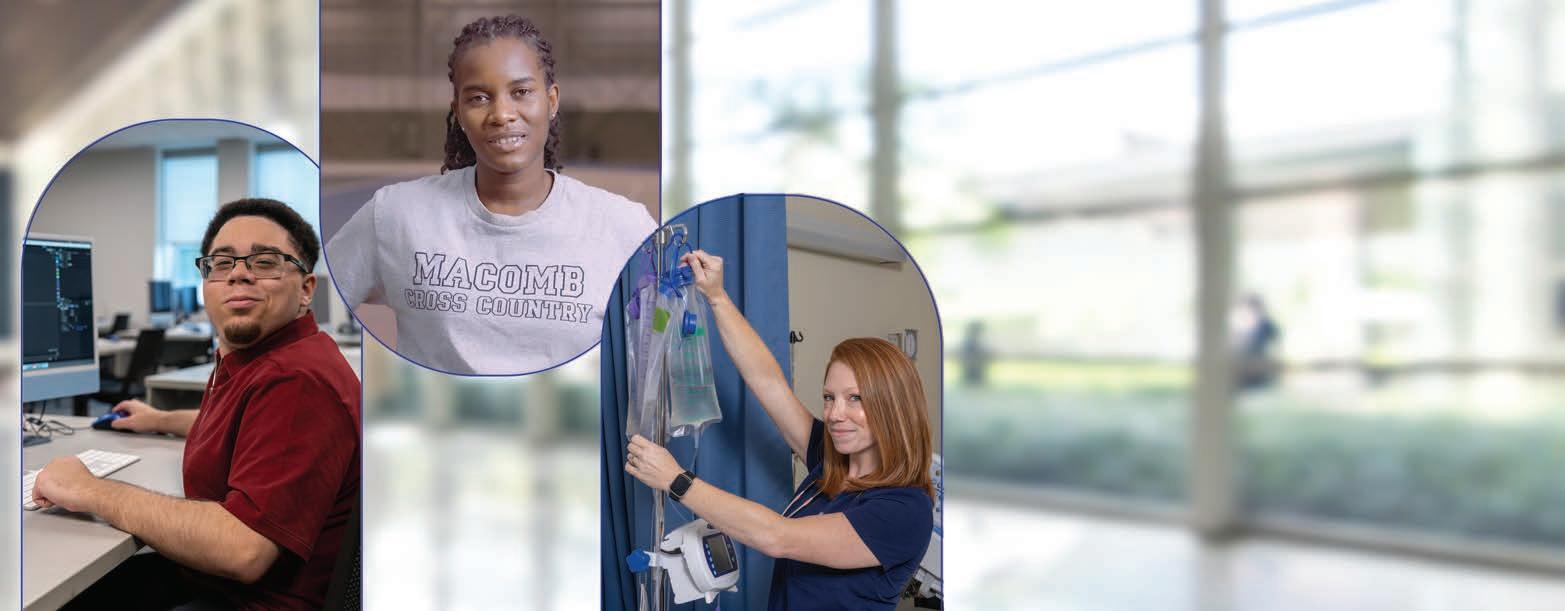
“My Macomb scholarship helped me pursue International Studies.”
“I
“I
Your journey begins here, at Eastern Michigan University, where diversity fuels innovation, where academic excellence meets unwavering support, and where we prepare you to step confidently into your first great job.
More than 13,000 students from 50 states and 83 countries call Eastern Michigan their home away from home—and it’s easy to see why. We offer more than 200 majors, minors, and concentrations delivered through five colleges—including programs with 100 percent job placement rates—you’ll graduate ready to launch a career you love. Our expert advisors and hands-on learning experiences ensure that you stay on track, gain career-ready skills, and stand out to employers the moment you cross the stage.
We offer a wealth of scholarships and financial aid opportunities. Eligibility for merit scholarships starts with a 2.75 grade-point-average, and our wide variety of scholarship programs includes the Eagle Guarantee—where students with a 3.0 grade-point average, an annual household income of less than $60,000, and Pell Grant eligibility are qualified for free undergraduate tuition and an extra $2,000 to help with on-campus housing. Your potential is our priority, and financial barriers shouldn’t stand in the way of your dreams.
In addition to our commitment to financial support, we believe that a campus isn’t just a place to study; it’s a vibrant home away from home. Located just 35 miles west of Detroit, EMU offers

unparalleled access to a multitude of internship and employment opportunities in Southeast Michigan. Our strong partnerships with local businesses and organizations provide students with practical experiences that complement their academic pursuits. To enhance your campus experience, we’ve invested more than $200 million to renovate campus housing, creating modern, welcoming, air-conditioned, and apartment-style living spaces that inspire creativity, foster connections, and offer the ultimate college lifestyle. Other newly renovated buildings house the sciences, engineering and technology, dining, recreation and fitness center, and wellness.
Are you ready to start a transformative journey? Go to emich.edu/visit to schedule your campus visit today.
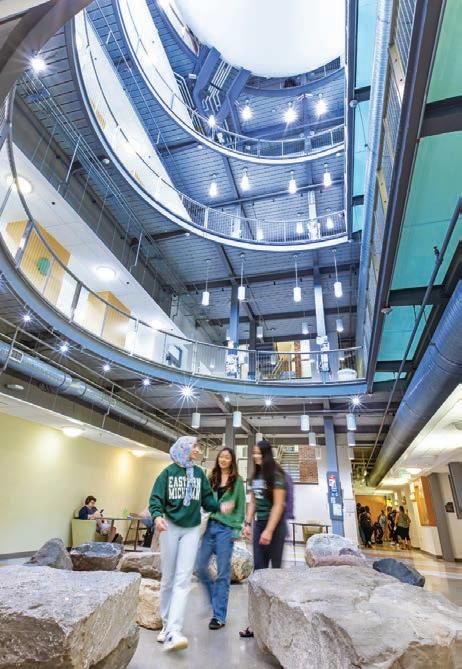

At Eastern Michigan University, your future begins the moment you step onto our campus. With over 200 majors—including programs boasting 100% job placement rates—plus expert advisors and hands-on learning opportunities, EMU ensures you gain the career-ready skills employers seek. Enjoy modern, air-conditioned housing and a campus designed to support your academic and professional growth.
Ready to launch your career? Visit emich.edu/visit to schedule your campus visit today. COME AS YOU ARE. BECOME MORE YOU.
By Ebony JJ Curry Senior Reporter
A degree in hand and a cap tossed in the air should symbolize opportunity, not a one-way ticket out of Michigan. Yet, for years, young Black professionals and recent graduates have found themselves at a crossroads: stay in the state they call home or leave for better job prospects elsewhere. The challenge is not a lack of talent; it’s about whether Michigan can create an environment that makes staying worthwhile.
Governor Gretchen Whitmer has made it clear that Michigan is doubling down on efforts to keep its graduates here. Her administration’s “You Can in Michigan” campaign speaks directly to young professionals, highlighting career opportunities across various industries and the benefits of building a life within the state. The campaign is not just about job listings; it is designed to show real pathways to success, access to housing, and resources that make Michigan competitive with other states.
Michigan is a state rooted in industry, but it is evolving in ways that directly impact career opportunities. The automotive sector remains a major employer, but it has expanded into electric vehicle manufacturing and clean energy initiatives. Healthcare is one of the fastest-growing fields, with hospitals and research institutions seeking new graduates in nursing, public health, and biomedical sciences. The technology sector is also making moves as companies invest in software development, cybersecurity, and artificial intelligence, offering competitive salaries to attract and retain skilled professionals.
The renewable energy sector is gaining traction as Michigan prioritizes sustainability. Wind and solar energy projects are growing, creating positions for engineers, environmental specialists, and technical workers. Skilled trades are in demand, too. Union apprenticeships and certification programs provide direct entry into high-paying careers in construction, electrical work, and plumbing—fields often overlooked despite their economic stability and strong job security.
State officials recognize that creating jobs is only half the battle. Michigan is actively working on programs that connect graduates to these opportunities before they even leave school. The Going PRO Talent Fund provides training grants to businesses, ensuring that companies invest in developing local talent rather than recruiting from outside the state. Programs like Michigan Reconnect help adults and non-traditional students gain access to tuition-free community college education, reinforcing the idea that career advancement does not always require leaving home.
Internship programs are also expanding, offering hands-on experience that increases the likelihood of job placement post-graduation. The Michigan STEM Forward program, backed by the Michigan Economic Development Corporation, connects college students
with paid internships at leading tech companies. The goal is simple: expose students to Michigan-based careers early, so they see a future here before looking elsewhere.
Financial incentives are playing a role in making Michigan attractive for young professionals. The state has launched initiatives offering student loan repayment assistance for those who commit to working in high-need sectors. There are also housing incentives, particularly in Detroit, Grand Rapids, and Ann Arbor, where first-time homebuyer assistance is helping young professionals establish roots instead of chasing opportunities in states with higher costs of living.
For some, staying in Michigan is a choice that pays off. Chelsea Matthews, a 2022 Michigan State University graduate, was considering relocating to Chicago for a marketing role until she found an opportunity with a Detroit-based tech startup. “I wanted to be in a place where my work mattered and where I had room to grow,” she said. “Michigan isn’t just a stepping stone— it’s a place where I can build something.”
Similarly, Justin Carter, a mechanical engineering graduate from the University of Michigan, was heavily recruited by firms on the West Coast. He chose to stay in Michigan after landing a position with a leading EV manufacturer in Metro Detroit. “The industry here is changing, and I wanted to be a part of it,” he said. “There’s no reason Michigan can’t be the place for innovation.”
Retention efforts are showing signs of progress, but challenges remain. Wage disparities compared to other major metropolitan areas still concern young professionals, especially those with student loan debt. Some industries have yet to close the racial equity gap in leadership roles, making career advancement a real concern for Black graduates looking for long-term growth in their fields. These realities make it essential for policymakers and employers to do more than just offer jobs—they must create environments where diverse professionals feel valued and supported.
Detroit, once considered a city people left, is now positioning itself as a city where people stay. Initiatives such as the Gilbert Family Foundation’s commitment to revitalizing downtown and Invest Detroit’s work in developing Black-owned businesses are shifting the narrative. The city’s entrepreneurial ecosystem is also gaining attention, with organizations like TechTown Detroit providing resources and funding to Black tech founders who may otherwise struggle to secure capital in more traditional markets.
Beyond corporate jobs, Michigan’s growing cultural scene is another reason some are choosing to stay. The state’s investment in arts and entertainment, from the expansion of the Detroit Institute of Arts to the city’s booming music and film industry, is providing creatives with real opportunities to thrive. Michigan’s cost of living remains a strong selling point, allowing professionals to build generational wealth in
ways that might be impossible in higher-cost states. For Michigan to fully realize its potential in talent retention, collaboration must continue. Universities, businesses, and policymakers must align their efforts to ensure that opportunities are not just available but accessible to those who need them most. Employers must be intentional about diversifying their workforce and creating work cultures that foster belonging. Graduates must-see Michigan as a place where they can succeed without compromise.
The conversation around the talent drain is ongoing, but Michigan is making moves to change the narrative. The choice to stay and invest in this state is becoming less about necessity and more about opportunity. For those who are willing to see Michigan for what it is becoming rather than what it was, the future looks increasingly bright. The question now is whether Michigan can keep proving itself to the young Black talent it needs most.
For those weighing their options post-graduation, the decision isn’t just about where to work—it’s about where to build. Michigan is making its case. The next move is on the graduates themselves.

By Lisa Brooker Director of Financial Aid, Schoolcraft College
While the cost of college has gone up throughout the years, there are plenty of opportunities offered through the State of Michigan for new students to enroll at Schoolcraft College tuition-free or tuitionreduced.
The program, the Community College Guarantee, provides a scholarship to high school graduates beginning with the class of 2023 that covers the unmet cost of in-district tuition, as well as up to $1,000/year for Pell-eligible students.
This program – which began last summer after being launched by the state – allows in-district students the ability to earn an associate degree or certificate with no tuition costs to them.
Some caveats exist for students to take advantage of the program: they must enroll full-time (12+ credits), be a resident of Michigan since July 1 of the previous year and continue living in Michigan while attending school. For students dependent on the FAFSA, the residency requirement is based on their parent(s). All interested students need to do is complete their Free Application for Federal Student Aid (FAFSA) and list Schoolcraft College as their top choice. The Office of Financial Aid will notify them if additional documents are needed for this award. So long as they meet the qualifications and begin using this program within 15 months of high school completion, students will receive the aid.
“This program is revolutionary for today’s high school graduates,” said Dr. Glenn Cerny, President of Schoolcraft College. “This program opens new opportunities for recent high school graduates and takes away the question of ‘Can I afford to go to college?’ With the Community College Guarantee, that answer is ‘yes.’”
Schoolcraft College students have already taken advantage of the program: nearly 2,000 students were awarded the award last fall at Schoolcraft College. More than 1,000 students were also awarded the bonus $1,000. Overall, more than $2 million in tuition and award
payments were granted to Schoolcraft College students in the first semester covered by the Community College Guarantee.
These figures have made a massive difference in helping students afford college: the Community College Guarantee paid out more than six times the amount the state covered previously with the Michigan Achievement scholarship the previous fall semester. The average student received about $700 more with the Community College Guarantee than they did with the Michigan Achievement scholarship. The program covers in-district tuition, so students living within the Schoolcraft College district are completely covered. For those who reside outside the College’s district, the Community College Guarantee will pay for the in-district rate, with the student making up the difference between the in-district and out-of-district rate. There are scholarship opportunities available for books and other expenses, as well as the out-ofdistrict portion of tuition for qualifying students. This provides a massive discount to enroll at Schoolcraft College with one of its many top-tier programs, including Culinary Arts, Nursing, Welding and more.

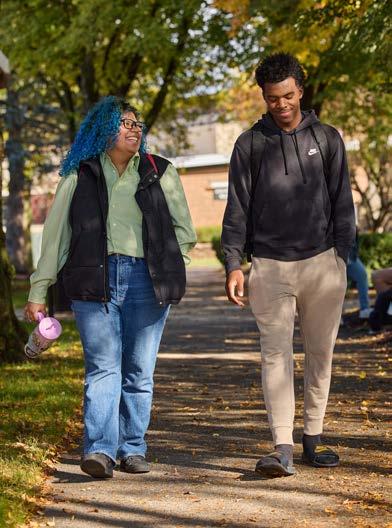
OCC is the smart first step in becoming a teacher
It’s almost as if Joel Lewis II was destined to end up at OCC, and not just because he hails from the southwest Detroit area. Joel’s greatest fan, and mentor — his mom — set the example by earning her associates degree at OCC, as did his sister.
OCC is the smart first step in becoming a teacher
OCC is the smart first step in becoming a teacher
OAKLAND COMMUNITY COLLEGE
It’s almost as if Joel Lewis II was destined to end up at OCC, and not just because he hails from the southwest Detroit area. Joel’s greatest fan, and mentor — his mom — set the example by earning her associates degree at OCC, as did his sister.
It’s almost as if Joel Lewis II was destined to end up at OCC, and not just because he hails from the southwest Detroit area. Joel’s greatest fan, and mentor — his mom — set the example by earning her associates degree at OCC, as did his sister.
like MSU, Oakland University, University of Michigan, or in my case Wayne State.”
ike MSU, Oakland University, University of Michigan, or in my case Wayne State.”
like MSU, Oakland University, University of Michigan, or in my case Wayne State.”
Joel took the sage advice from mom and enrolled at OCC. It wasn’t long before he settled into student life.
OAKLAND COMMUNITY COLLEGE
Joel took the sage advice from mom and enrolled at OCC. It wasn’t long before he settled into student life.
Learn why OCC is a great place to startyoursomeday. Join a campus tour or virtual admission event. Visit oaklandcc.edu/getstarted
Joel took his family’s guidance to heart, but his career choice was still in question. A small part of him still wanted to turn his love of English and writing into a career as an advertising copywriter. That is, until he had a lifealtering conversation with an academic advisor at Wayne State University.
Joel took the sage advice from mom and enrolled at OCC. It wasn’t long before he settled into student life.
It’s almost as if Joel Lewis II was destined to end up at OCC, and not just because he hails from the southwest Detroit area. Joel’s greatest fan, and mentor — his mom — set the example by earning her associates degree at OCC, as did his sister.
Joel took his family’s guidance to heart, but his career choice was still in question. A small part of him still wanted to turn his love of English and writing into a career as an advertising copywriter. That is, until he had a life-altering conversation with an academic advisor at Wayne State University.
Joel took his family’s guidance to heart, but his career choice was still in question. A small part of him still wanted to turn his love of English and writing into a career as an advertising copywriter. That is, until he had a lifealtering conversation with an academic advisor at Wayne State University.
Joel took his family’s guidance to heart, but his career choice was still in question. A small part of him still wanted to turn his love of English and writing into a career as an advertising copywriter. That is, until he had a lifealtering conversation with an academic advisor at Wayne State University.
“She sized me up pretty quickly and recommended I check into OCC to begin my undergrad course work. She explained how OCC has a very straight-forward and student-friendly approach to financial aid, scholarships and transfers to other institutions. The Michigan Transfer Agreement facilitates the transfer of credits from OCC to schools
“She sized me up pretty quickly and recommended I check into OCC to begin my undergrad course work. She explained how OCC has a very straight-forward and studentfriendly approach to financial aid, scholarships and transfers to other institutions. The Michigan Transfer Agreement facilitates the transfer of credits from OCC to schools
“She sized me up pretty quickly and recommended I check into OCC to begin my undergrad course work. She explained how OCC has a very straight-forward and studentfriendly approach to financial aid, scholarships and transfers to other institutions. The Michigan Transfer Agreement facilitates the transfer of credits from OCC to schools
“She sized me up pretty quickly and recommended I check into OCC to begin my
“Having the flexibility to take online and in-person classes really fits my situation. I’m able to balance substitute teaching, coaching Special Olympics basketball and taking classes at OCC without the specter of lifecrushing student loan debt hanging over my head.”
Learn why OCC is a great place to startyoursomeday. Join a campus tour or virtual admission event. Visit oaklandcc.edu/getstarted
Learn why OCC is a great place to start your someday. Join a campus tour or virtual admission event. Visit oaklandcc.edu/getstarted
like MSU, Oakland University, University of Michigan, or in my case Wayne State.”
Joel took the sage advice from mom and enrolled at OCC. It wasn’t long before he settled into student life.
“Having the flexibility to take online and in-person classes really fits my situation. I’m able to balance substitute teaching, coaching Special Olympics basketball and taking classes at OCC without the specter of lifecrushing student loan debt hanging over my head.”
“Having the flexibility to take online and in-person classes really fits my situation. I’m able to balance substitute teaching, coaching Special Olympics basketball and taking classes at OCC without the specter of life-crushing student loan debt hanging over my head.”
Fundamentals of Speech professor, Dempsey Harrison III, who really takes the time to make the course material personally relevant to each student and their respective situation.”

Fundamentals of Speech professor, Dempsey Harrison III, who really takes the time to make the course material personally relevant to each student and their respective situation.”
Fundamentals of Speech professor, Dempsey Harrison III, who really takes the time to make the course material personally relevant to each student and their respective situation.”
Another aspect of the OCC experience Joel really appreciates is the deeper connection he enjoys with his professors, and with the course material.
Another aspect of the OCC experience Joel really appreciates is the deeper connection he enjoys with his professors, and with the course material.
Another aspect of the OCC experience Joel really appreciates is the deeper connection he enjoys with his professors, and with the course material.
“The smaller, more intimate class sizes at OCC allows professors to make the class material relevant to each student’s individual journey. And no one personified this approach more than my
Joel is well on his way to achieving his ultimate goal of becoming a middle school English teacher, a role he believes will give him the opportunity to help shape young minds and serve as a role model for children, particularly those of color.
“The smaller, more intimate class sizes at OCC allows professors to make the class material relevant to each student’s individual journey. And no one personified this approach more than my
“Having the flexibility to take online and in-person classes really fits my situation. I’m able to balance substitute teaching, coaching Special Olympics basketball and taking classes at OCC without the specter of lifecrushing student loan debt hanging over my head.”
“The smaller, more intimate class sizes at OCC allows professors to make the class material relevant to each student’s individual journey. And no one personified this approach more than my
Another aspect of the OCC experience Joel really appreciates is the deeper connection he enjoys with his professors, and with
Joel is well on his way to achieving his ultimate goal of becoming a middle school English teacher, a role he believes will give him the opportunity to help shape young minds and serve as a role model for children, particularly those of color.
Joel is well on his way to achieving his ultimate goal of becoming a middle school English teacher, a role he believes will give him the opportunity to help shape young minds and serve as a role model for children, particularly those of color.
how kids see themselves and the opportunities available to them. It wasn’t long into my OCC experience that I felt I was locked into exactly what I’m supposed to be doing…which is to help these impressionable, young kids try to reach a level they don’t even know is possible yet.”
how kids see themselves and the opportunities available to them. It wasn’t long into my OCC experience that I felt I was locked into exactly what I’m supposed to be doing…which is to help these impressionable, young kids try to reach a level they don’t even know is possible yet.”
how kids see themselves and the opportunities available to them. It wasn’t long into my OCC experience that I felt I was locked into exactly what I’m supposed to be doing…which is to help these impressionable, young kids try to reach a level they don’t even know is possible yet.”
Learn why OCC is a great place to startyoursomeday. Join a campus tour or virtual admission event. Visit oaklandcc.edu/getstarted
Joel Lewis II is on schedule to complete his course work and transfer by the fall of ‘24, and thanks to OCC and all of his hard work and dedication, his “Someday” is fast approaching.
Fundamentals of Speech professor, Dempsey Harrison III, who really takes the time to make the course material personally relevant to each student and their respective situation.”
“Seeing an educated black man at the head of the classroom at such a young and impressionable age can have a profound impact on
“Seeing an educated black man at the head of the classroom at such a young and impressionable age can have a profound impact on
“Seeing an educated black man at the head of the classroom at such a young and impressionable age can have a profound impact on
Joel Lewis II is on schedule to complete his course work and transfer by the fall of ‘24, and thanks to OCC and all of his hard work and dedication, his “Someday” is fast approaching.
Joel Lewis II is on schedule to complete his course work and transfer by the fall of ‘24, and thanks to OCC and all of his hard work and dedication, his “Someday” is fast approaching.
OAKLAND COMMUNITY COLLEGE oaklandcc.edu/admissions
Joel is well on his way to achieving his ultimate goal of becoming a middle school English teacher, a role he believes will give him the opportunity to help shape
how kids see themselves and the opportunities available to them. It wasn’t long into my OCC experience that I felt I was locked into exactly what I’m supposed to be doing…which is to help these impressionable, young kids try to reach a level they don’t even know is possible yet.”
OAKLAND COMMUNITY COLLEGE oaklandcc.edu/admissions
Joel Lewis II is on schedule to complete his course work and transfer by the fall of ‘24, and

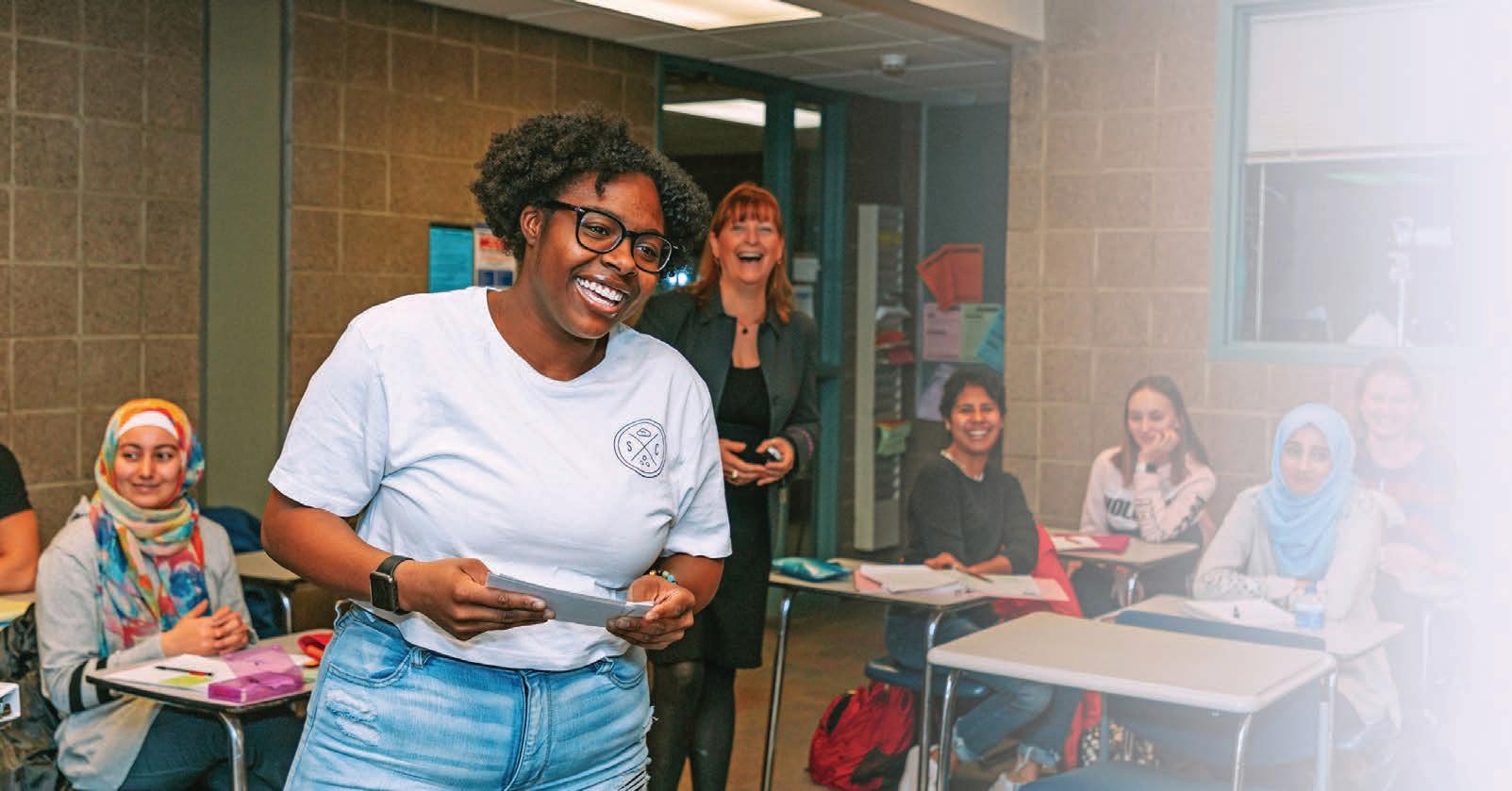
Programs designed for both direct entry into hot careers and university transfer
Flexible scheduling and convenient online or inperson classes

Committed to diversity, equity and inclusion
*Based on transferring 60 credits to a public university
Save more than $22,000* when pursuing a 4-year degree
Financial aid and more than $500,000 awarded scholarships each year
Personalized instruction from faculty with real-world experience
By Ebony JJ Curry Senior Reporter
Here in Michigan, when a high school junior or senior sits and wonders what life looks like after graduation, Michigan offers this promise: you don’t have to leave home to become successful. Michigan offers a lot of universities that are top success stories, including some of the most influential and wealthy people that this nation has seen thus far. Michigan is a gem, and the people who are a part of it continue the legacy and push the narrative of tomorrow’s success.
Imagine standing at a crossroads, where every path promises a journey filled with discovery, growth, and achievement. This isn’t just a metaphorical landscape but a real one, nestled in the heart of America—Michigan. Far from being mere dots on a map, Michigan’s universities are vibrant epicenters of knowledge, where dreams are forged into reality and futures are built. Here, the pursuit of excellence isn’t confined to textbooks but is a lived experience, making Michigan not just a state but a state of mind for those who dare to dream big.
The tales of success emanating from these institutions are not confined to academic journals or corporate boardrooms; they are written in the lives of individuals who walk the halls of these universities. From leaders who steer global enterprises to innovators who challenge the status quo, Michigan’s alumni are living proof that excellence knows no geographical bounds. Their journeys inspire, their achievements challenge, and their stories invite you to see yourself as part of this ongoing legacy of success.
So why should you care? Michigan’s universities embody the quintessential American promise: that with hard work, dedication, and access to the right resources, anyone can achieve greatness. They remind us that to shape the future, we must invest in the present, nurture talent, and foster innovation right where we are. This narrative is not just for those in the academic or professional world; it’s a call to action for anyone who believes in the transformative power of education.
As we turn the pages of Michigan’s educational saga, we’re not just reading about institutions; we’re witnessing a movement. A movement that champions diversity embraces innovation and believes in the power of community. It’s a narrative that encourages us to look beyond the familiar, to see potential in our backyards, and to realize that the journey to success begins with the steps we take here and now. Michigan’s universities have been instrumental in shaping the trajectories of many notable individuals across various fields, from entertainment and sports to politics and business. Here’s a closer look at the influence of these institutions on a selection of distinguished figures:
David Allen Grier is an accomplished actor and comedian known for his work on the sketch comedy television show “In Living Color.” Grier honed his craft at the University of Michigan, where he earned a Master of Fine Arts degree from the School of Music, Theatre & Dance. His time at the university laid the groundwork for a successful career in both Broadway and television, highlighting the impact of Michigan’s commitment to the arts.
Dan Gilbert is the founder of Quicken Loans, the largest mortgage lender in the United States and owner of the NBA’s Cleveland Cavaliers. Gilbert graduated from Michigan State University with a bachelor’s degree in communications and later earned his Juris Doctor from Wayne State University Law School. His entrepreneurial spirit was nurtured in Michigan’s educational ecosystem, which emphasizes innovation and business acumen.
Jemele Hill is a sports journalist who has worked for ESPN and now writes for The Atlantic. Hill’s passion for sports and writing was cultivated at Michigan State University, where she graduated with a degree in journalism. Her time at MSU was pivotal, providing her with the skills and opportunities to become a prominent voice in sports journalism.
Stephen Ross is a real estate developer, philanthropist, and the owner of the Miami Dolphins. Ross attended the University of Michigan, where he earned his Bachelor of Business Administration degree. His education at Michigan’s Ross School of Business, named in his honor due to his significant contributions, was crucial in developing the foundation for his success in real estate and sports management.
George Gervin, nicknamed “The Iceman,” is a retired professional basketball player widely regarded as one of the game’s greatest shooting guards. Gervin attended Eastern Michigan University, where his exceptional talent on the basketball court began to shine. Although his time at EMU was brief, it played a role in launching his professional career.
Earvin “Magic” Johnson is a former professional basketball player and current President of basketball operations for the Los Angeles Lakers. Johnson’s journey to fame began at Michigan State University, where he led the Spartans to the NCAA championship in 1979. His time at MSU not only polished his skills on the court but also instilled leadership qualities that would define his career.
Debbie Stabenow former United States Senator from Michigan. Stabenow is an alumna of Michigan State University, where she earned both her bachelor’s and master’s degrees. Her educational background in social work and public policy at MSU laid the groundwork for her long and distinguished career in public service.
Draymond Green is a professional basketball player for the Golden State Warriors. Green’s formidable skills were developed at Michigan State University, where he played college basketball for the Spartans. His time at MSU was marked by significant growth, both on and off the court, leading to a successful career in the NBA.
James Earl Jones is an actor renowned for his deep, resonant voice, used to memorable effects as the voice of Darth Vader in “Star Wars” and Mufasa in “The Lion King.” Jones attended the University of Michigan, where he initially enrolled in the pre-med program before switching to drama, laying the foundation for his illustrious acting career.
Gerald Ford, the 38th President of the United States, attended the University of Michigan, where he was a star football player before graduating with a degree in economics. Ford’s time at Michigan not only contributed to his physical prowess but also developed his leadership and team-building skills, which would become hallmarks of his political career. These individuals exemplify the diverse ways in which Michigan’s universities serve as catalysts for personal and professional development, preparing students to make significant contributions in their respective fields.
Dive deeper into Michigan’s academic heartland, and you’ll find a mosaic of institutions, each a microcosm of innovation and tradition. From the campuses of the University of Michigan, Michigan State University, and Wayne State University, known collectively as the University Research Corridor, to the intimate, community-focused halls of Calvin University, Hope College, and Kalamazoo College, Michigan offers a kaleidoscope of educational experiences. These aren’t just institutions; they’re launchpads for the next generation of thinkers, leaders, and visionaries.
But why does this matter to you, the reader? The story of Michigan’s universities is not just about buildings and curriculums; it’s about the human spirit’s indomitable will to learn, innovate, and excel. It’s a narrative that echoes the aspirations of anyone who has ever yearned for more—more knowledge, more opportunity, more impact. Michigan’s educational landscape is a testament to the fact that one’s environment can profoundly shape one’s destiny, offering a world-class education within reach, fostering local talent, and contributing to the global community. Michigan’s universities are more than just places of learning; they are beacons of hope and engines of change. They stand as a vivid reminder that education is the cornerstone of personal and societal growth; we’re not just building careers; they’re molding students today to become leaders of tomorrow.
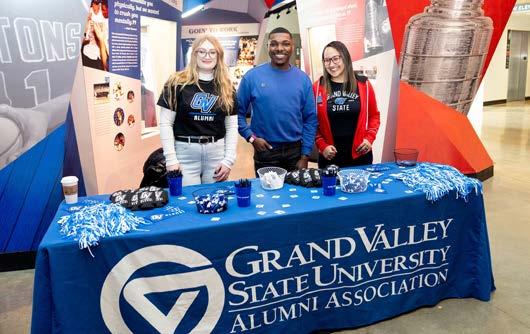
By Annie Pettit
Since becoming Grand Valley State University’s director of Southeast Michigan, Shawntae Mintline has expanded GVSU Omni partnerships and programs in that region, in addition to her duties of overseeing the Detroit Center. Mintline had worked for Wayne State University as associate director of Academic Programs and
Institutional Effectiveness, with oversight of accreditation and academic program review in the provost’s office. Prior to that, she worked as an academic advisor at Wayne State and Washtenaw Community College.
Kara Van Dam, vice president and chief executive of GVSU Omni, said Mintline’s knowledge of the metro Detroit area and her diverse experience will help her succeed in an important region for Grand Valley.
“Shawntae’s Southeast Michigan roots across the entire education spectrum, from early childhood to community colleges to four-year institutions, and her rich experience in nonprofit organizations, speak to her passion for community, relationships and the power of educational equity and access,” Van Dam said.

her to complete a bachelor’s degree in sociology and begin a career path.
“I told that advisor, ‘I want to do what you do,’” she said.
Mintline earned a master’s degree in educational leadership, with an emphasis on higher education student affairs, from Eastern Michigan University. She is completing a doctoral degree in counseling and student development from Kansas State University.
Since becoming director, Mintline has spoken to many Grand Valley staff, faculty and administrators about their work potential in Southeast Michigan. These meetings have expanded her understanding of academic programs that would be a good fit for the region.
Mintline said she’s very familiar with Omni’s population of adult learners, as she once was one. Mintline lost her job during the 2008 recession when she was a traditional undergraduate student at the University of Michigan-Flint.
“Things snowballed from there. I was evicted from my apartment and was couch surfing with friends for a while,” she said.
About six years after leaving college, Mintline talked to an academic advisor. That conversation spurred
For Grand Valley students, next is opportunity and innovation. Next is global, connecting and uniting us. It’s local, shaping the spaces in which we work and live. It’s a commitment to progress. Next is where minds are free to imagine what could be. At GVSU, next is now. And whatever’s next for you, we will help you get there.
Mintline has strengthened Grand Valley’s presence into other parts of Southeast Michigan as well, joining the Flint & Genesee Chamber and the Blue Water Area Chamber in Port Huron. “It’s a very diverse area and I’m looking forward to visiting more communities within the region in the coming months,” she said.
“Omni is targeting people who were like me, people needing to finish their degrees. That type of program is missing at many universities; I’m grateful to Grand Valley for creating Omni, which offers flexibility to students,” she said.
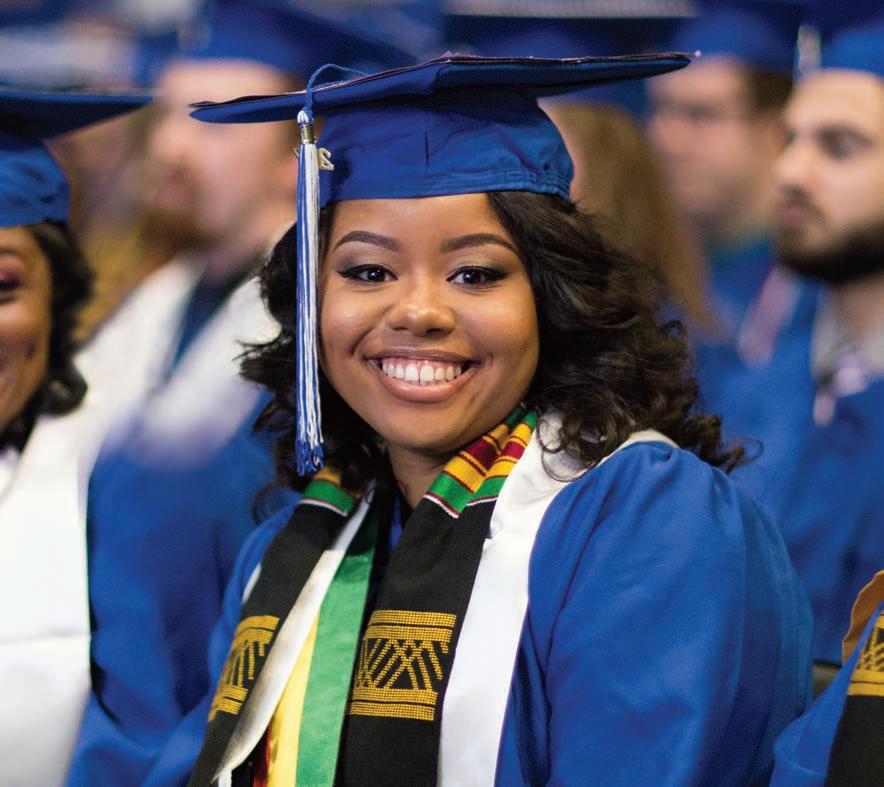

First generation college student PAIGE BURNS knew a college degree would be the best asset to design a successful future. With an initial draw to Oakland University’s outstanding scholarship and financial aid opportunities, Paige also discovered community, academic excellence and career readiness along the way. Deeply immersed in an array of campus activities, like the Business Honors Program and mentoring others, the finance major shines at OU – and is ready to ignite her future.
Being the first generation to earn a college degree encompasses a range of emotions – from pride to uncertainty, but walking across the stage will be the highlight of them all. Through the support of her family, Paige took that leap, leading her toward new opportunities, communities and career choices. At Oakland University, we make it a priority to connect first-generation college students to a variety of resources and initiatives to ensure a smooth transition and future success. Students surround themselves with support in the classroom and campus clubs, confidently creating the next stage of their life.
At OU, students spark their curiosity and explore the world beyond the classroom. Paige seamlessly weaved classroom concepts into the Business Scholars Program, surrounding herself with realworld professionals to help to identify unique strengths, interests and values while developing meaningful career connections. Located in Metro Detroit, Oakland University is at the epicenter of opportunity: Our Golden Grizzlies get internships and land job placements with major corporations, local school districts, governments and nonprofits.
Oakland University strives to make an exceptional education affordable. Recognized for her academic achievement, Paige received scholarship support from OU’s Honors College, allowing her to fully focus on her studies. The university firmly believes in the responsibility to create pathways of opportunity for all students. We’re proud to offer free tuition for up to four years to eligible incoming Michigan first-year students. OU’s Golden Guarantee works in combination with the Michigan Achievement Scholarship, OU merit and need-based aid to help cover both tuition and other costs, such as housing and living expenses.
Get a feel for our college community and learn what Oakland University is all about by visiting our beautiful campus in Rochester. With a variety of in-person events and student-led tours, you can find the experience that best fits your schedule and interests. Visit oakland.edu/visit to get started.
With nearly 120 undergraduate degree programs, the future is golden for students of all academic aspirations. Whether it’s teaching, engineering or anything in between, OU students fulfill their ambition amid a thriving campus community where educational excellence and experiencebased learning comes alive. With a passion for numbers, Paige Burns found her career calling in finance studies. In her classrooms, professors became mentors, making important connections between theory and practice.

• Finance major
• Business Honors Program
• Peer mentor in the Center for Multicultural Initiatives
• First generation college student


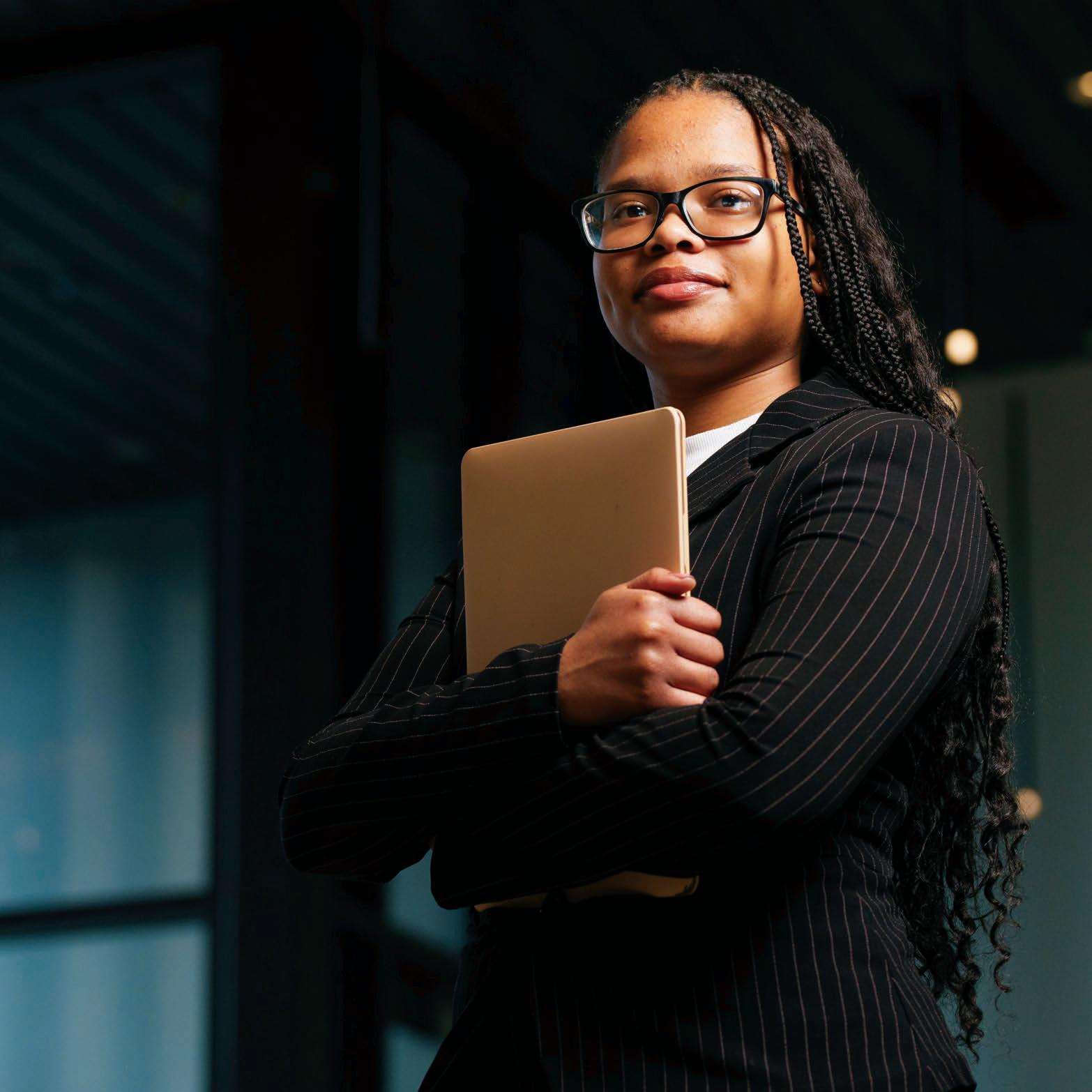
By Ebony JJ Curry Senior Reporter
Many people pursuing a PhD opt for the traditional path of a thesis-based Doctorate, but that’s just one of five routes available. Whether full-time or parttime, students have a variety of ways to achieve this prestigious academic qualification, each with its own distinct structure. This means that earning a Doctorate is not a one-size-fits-all process; it depends on the individual’s goals, profession, and life circumstances. For those who choose the PhD by thesis, it’s the most familiar path to earning a Doctorate. Typically lasting between three and four years, this process involves creating a substantial written thesis that reflects original research. Thesis lengths vary depending on the institution, but they generally fall between 60,000 and 90,000 words. For example, the University of Glasgow expects 70,000 to 100,000 words, while the University of Cambridge caps it at 80,000. At the end of this journey, candidates defend their work in front of examiners, a nerve-wracking but necessary step. Another less conventional but increasingly popular route is the PhD by publication. This option caters more to mid-career academics who have produced significant research but didn’t pursue a traditional Doctorate. Instead of crafting a thesis, these individuals submit previously published works— journal articles, book chapters, or entire books— accompanied by a detailed supporting statement. This written component, which is typically between 5,000 and 15,000 words, demonstrates how their body of work makes an original contribution to their field. Different institutions set their own standards, like Queen Margaret University in Edinburgh, which requires a statement between 12,000 and 15,000 words, while the University of Westminster asks for 5,000 to 10,000 words, depending on the discipline. This route is rigorous and requires careful curation of past work to meet the academic institution’s high expectations.

For professionals in fields like engineering, healthcare, or education, the Professional Doctorate offers a more vocational route to a Doctorate. Rather than a large research thesis, students complete a smaller research project paired with taught modules. These degrees typically take between two and eight years, often on a part-time basis, accommodating professionals who continue to work while studying. What distinguishes professional Doctorates, like the Doctor of Education (EdD) or Doctor of Business Administration (DBA), is their focus on practical issues within the candidate’s profession. Many of these degrees, such as the Doctorate in Clinical Psychology (DClinPsy), lead to professional qualifications recognized by governing bodies like the Health & Care Professions Council (HCPC).
A New Route PhD, also known as an Integrated PhD, combines a one-year Master’s in Research (MRes) with a three-year Doctoral research program. This route offers additional support and training to develop a candidate’s research skills while fostering leadership potential. Universities like the University of Exeter and the University of Reading offer tailored, Integrated PhD programs to meet specific research needs. This option is ideal for students who want to strengthen their foundation before embarking on full Doctorallevel research.
Lastly, the rise of online and distance learning PhDs has opened the door for individuals who need more flexibility, whether due to geographic location, work, or family commitments. These programs, offered by institutions such as the Open University, allow students to work remotely while maintaining close contact with their supervisors through video calls and emails. Distance learning can be done part-time or fulltime, and while students might be required to attend campus for short stints throughout the academic year, most of the work is done independently.
The demand for Doctorates continues to rise. Over the last two decades, the number of science and engineering Doctorates grew by 74%, increasing
their share of total Doctorates to 79%. Fields like engineering, biological and biomedical sciences, and physical sciences saw some of the largest gains. By contrast, Doctorates in Education and the Humanities have experienced a notable decline, with education down by 44% over the past 20 years.
The demographic shifts in those earning Doctorates are also significant. Women now account for 47% of all research Doctorates, a steady increase from previous decades. Nonwhite recipients have grown even more rapidly: the number of Black/African American recipients has jumped by 34%, while the number of Hispanic/Latino recipients has surged by more than 50%. Meanwhile, the number of white recipients has decreased. Additionally, the number of international students earning Doctorates in the U.S. has increased substantially, with temporary visa holders now comprising 34% of Doctoral recipients, a rise of more than 5% over the last decade.
Notably, the time required to earn a Doctorate has decreased across many disciplines. On average, it now takes 7.2 years to complete a Doctorate, down from 8.6 years in 2002. Fields like health sciences have seen the biggest reduction, while fields like chemistry and engineering have consistently short completion times of around six years.
The institutions awarding the most Doctorates in 2022 include the University of Michigan, Stanford University, and the University of California, Berkeley. The data suggests that financial support, parental educational attainment, and other factors continue to shape the landscape of Doctoral education in the U.S.
Earning a Doctorate, regardless of the path taken, remains a significant personal and professional achievement. With more diverse routes and growing flexibility, advanced education is becoming increasingly accessible to those who once found it out of reach. The surge in research Doctorates, especially in fields that drive innovation, highlights the critical role these degrees play in shaping the future of various industries and academic disciplines.
University of Detroit Mercy (UDM) is Michigan’s largest and most comprehensive Catholic university, offering more than 100 undergraduate, graduate and professional degrees and programs
For 2025, The Wall Street Journal/College Pulse ranked UDM among the nation’s TOP 50 UNIVERSITIES UDM ranked No. 43, improving nine spots over its 2024 ranking, and is
• The second-highest ranked university in Michigan.
• The top ranked Catholic university in the state.
• The No. 2 Catholic university in the Midwest.
• The sixth-highest ranking Catholic university in the United States.
• The fifth ranked university among all Association of Jesuit Colleges & Universities in the country.
• The highest ranked Mercy institution.
Donald B. Taylor, president of UDM, said that with these rankings, “UDM is now in the top 1% of 4,300 higher education institutions in the country. We are honored that so many of tomorrow’s leaders have entrusted us with their college education.”
At UDM, almost 100% of students receive experiential and co-op opportunities, engaging in hands-on, realworld projects before they graduate. Our commitment to healthcare education was strengthened in 2024 by the opening of our new School of Optometry and

Detroit Mercy Eye Institute. It is just the second school of optometry in Michigan and will welcome its first class of students in fall 2025.
The University is breaking records with its fundraising and thanks to generous donors, Detroit Mercy has repurposed an unused building to create a makerspace center for use by all students. This exciting new space is opening doors to unique collaborations among departments, programs and disciplines.
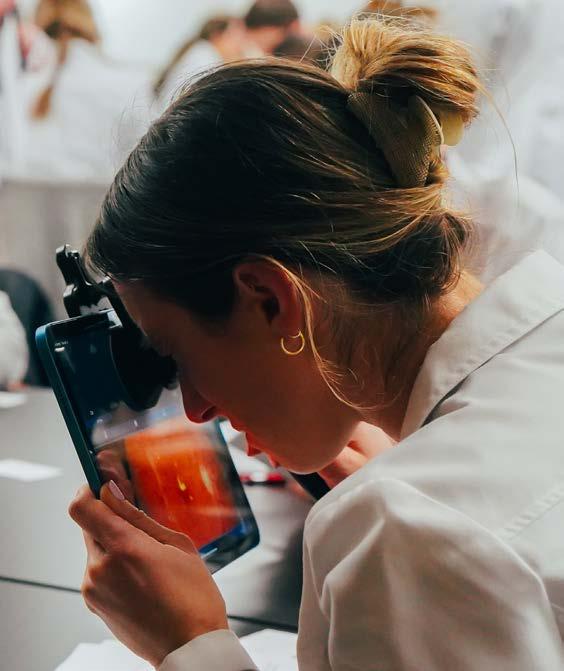
In terms of outcomes, our students earn an average of $67,000 a year compared to the national average for new graduates of $58,000 a year. UDM alums rank among the top 10% graduates of U.S. universities in earning a higher return on investment for their education according to the Georgetown University report A First Try at ROI: Ranking 4,500 Colleges. Over your career, you can expect to earn $1.2 million more than those who forgo a college education. To learn more about how you can become a Titan and start shaping the world for the better, visit www.udmercy.edu today!

Recently, UDM’s College of Engineering & Science opened the Steve & Kathy McShane Makerspace & Collaboratory, a new space designed as a workshop for students from different disciplines to work together and share ideas as they work on projects, competition teams and product refinement with an eye toward commercialization and entrepreneurship.


Consider the next step from where you are right now… Start to consider your options… then take the steps to get where you want to go.
• Enroll in college
• Enroll in an apprentice training program
• Seek an internship while in college
• Apply for your first job out of college
• Plan to transition from your current job to something new

Embarking on your college journey isn’t just about academics—it’s an opportunity to embrace a full campus life that extends beyond the classroom. Participating in clubs, sports and other extracurriculars not only adds fun to your college experience but also plays a pivotal role in shaping your character and skills. A vibrant campus offers many opportunities to pursue your interests and discover new ones. It’s a chance to break out of your comfort zone, try new things and develop well-rounded experiences.
To get a true feel for college life and all it has to offer, visiting a campus in person is the best way to experience it. At Davenport University, you can schedule an in-person tour to explore the university’s state-of-the-art classrooms, dining halls, labs, recreational centers and student housing. Walking the campus and engaging with current students will give you firsthand insight into life at Davenport. If you prefer an introduction before your visit, you can also take a virtual tour led by students Majesty and Julius at davenport.edu/virtual-tour to get a preview of the facilities, student services and campus life.
Davenport places a strong emphasis on fostering a supportive and engaging community. You’ll find that professors know your name and staff work to understand your interests. There are more than 40 student organizations, 44 athletic teams and many weekly activities to keep you involved. The university is committed to students’ overall well-being, providing 24/7 mental health services and interactive events to help manage stress and prioritize mental health.
You deserve a strong return on investment from your university, and Davenport delivers on that promise. With a focus on career readiness and hands-on learning, students graduate prepared for success in their fields.
Write your own college adventure. Join Davenport University, where every moment of transformation is a page in your book, and where the journey goes beyond academics, making every chapter unforgettable.

You want to attend a university that will help you achieve your academic and professional goals. Davenport offers more than 80 career-ready degrees and certificates, a scholarship for each incoming freshman student and an average student/teacher ratio of 18:1.
so much
You might have heard that Davenport University offers more than 80 career-ready degrees and certificates, and that 96% of our graduates are employed within six months of graduation. But that’s not the only reason we stand out.
Our small, safe campus features apartment-style residence halls with private rooms and shared rooms. We also have 44 athletic teams, including 26 NCAA Division II teams, plus all kinds of clubs and activities. With 100% of our incoming freshman students receiving scholarships and an average student/teacher ratio of 18:1, our students get the resources they need to succeed.
Check us out at davenport.edu/newstudent or call us at 800.686.1600

If you’re ready to dive deeper into all Davenport has to offer, check out davenport.edu/newstudent or call 800.686.1600. Get where the world is going
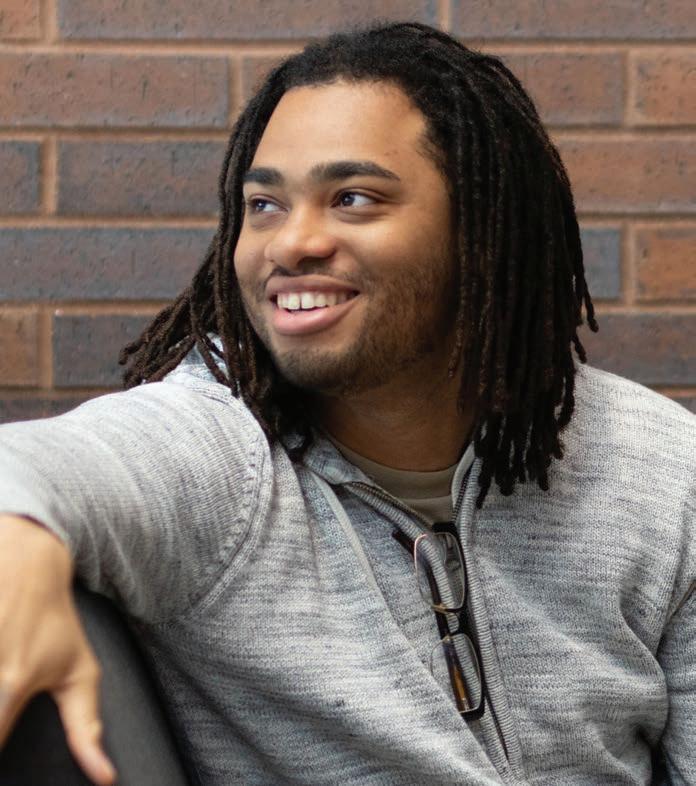
Black History Month is happening at UNIV. OF DETROIT MERCY--https://www.udmercy.edu/about/news/articles/2025/01-24-bhmevent-listing.php
Feb. 19
Student Life treat day celebrating Black-owned businesses Noon - 4 p.m.
Zalke Lounge, Lower Level, Student Union
Stop by the Student Life Office to enjoy a delicious treat as we celebrate local business Good Cakes and Bakes!
Feb. 24
Panel discussion, “The Talk” - Noon Bargman Room, McNichols Campus Library
A panel of professors, police, parents and local journalist Greg Bowens will discuss “The Talk” that African American parents have had for generations with their children — especially their sonsin an effort to keep them safe when confronted by law enforcement or other authority figures. Box lunch provided to those who RSVP.
Feb. 25
Soul food cooking class
6 p.m. – Eastern Market
Feb. 27
NOMAS lecture series with Bryan Cook
5 p.m.
SACD Exhibition Space
The National Organization of Minority Architecture Students (NOMAS) at Detroit Mercy’s School of Architecture & Community Development (SACD) will host the third annual Black History Month lecture series featuring three prominent Black designers.
Feb. 28
Titan Equity Nourish Network (TENN) game night
5 p.m.
Commerce & Finance Bldg. Rm. 104
Mar. 13
Macomb Community College – South Campus
Engineering And Advanced Technology Programs & Careers
7 p. m. to 8:30 p.m.
Learn more at macomb.edu/getstarted Questions? 586.445.7999 Select Admissions
Apr. 19
Junior Exploration Day, Saturday, April 19, 2025
10 AM – 2 PM
Davenport University
W. A. Lettinga Campus, 6191 Kraft Ave., Grand Rapids, MI 49512


Be positive
Stay focused
Be present – Go to class regularly
Find an ideal place to study
Meet with your professors
Seek help when needed
Be mindful of your spending/budget
Get involved with campus activities
Don’t party too much
Try to maintain good health
Get proper rest
Apply for an internship
Check in with family regularly
Keep your eyes on the prize---Graduation
Enjoy this time …You are making memories.
After graduating from Cass Tech, Detroit native Lauren Patterson was determined to pay whatever was necessary to become the first woman in her family to earn a college degree.
To her surprise, tuition and fees to Wayne State University would not be among those costs.
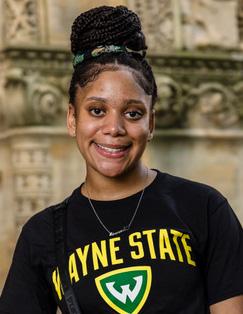
Instead, Patterson is one of hundreds of students who were accepted into Wayne State’s groundbreaking Heart of Detroit Tuition Pledge program, which allows eligible students to enjoy zero out-of-pocket expenses for tuition and fees.
“I was going to do what was necessary, even if it meant taking out loans, to get an education,” said Patterson. “But the Heart of Detroit program offset the tuition, and it has made going to school so much easier.”
Launched in 2020, the Heart of Detroit Tuition Pledge is open to current Detroit high school students and Detroit residents earning a high school diploma. It
covers tuition and standard fees for up to four years of full-time study and has proven to be a pathway to higher education and a bridge over the financial hurdles that traditionally deter countless Detroiters from attending college.
“The Heart of Detroit Tuition Pledge showcases our significant commitment to Detroit and its residents,” said Charles Cotton III, Wayne State’s vice provost for strategic enrollment management. “While we’re an institution with a global reach, it’s equally important that we don’t lose that sense of support for those in our immediate backyard.”
The program demonstrates the impact of cost-saving initiatives. For 2024-25, the Heart of Detroit has 1,740 participants, including 565 new students. So far, 217 have graduated, with 152 more set for the winter 2025 semester. More broadly, Heart of Detroit and other programs have been successful enough that 6 out of 10 of WSU’s first-year undergraduate students have attended the university tuition free in the last two years.
Cotton praised the university for its effort to keep tuition low for students across the board but conceded that, in today’s climate, the costs still pose a challenge for many. However, he noted that, unlike some other investments, a degree pays for itself and — then some — in the long run: “The collegiate education you receive is an appreciating asset, and we see that when looking into lifelong earning potential.”
The data backs this up; the U.S. Bureau of Labor Statistics reports that someone with a bachelor’s stands to earn more than $1 million more in their lifetime than someone without a degree.

For students like Patterson, however, a government report isn’t necessary to grasp the value of higher education.
“A degree certifies that you can be disciplined, that you can sit down and think critically,” she said. “I wake up every day to go to class, enrich myself and be in a setting with like-minded people. I’m here to earn my degree — and nothing will stand in my way.”

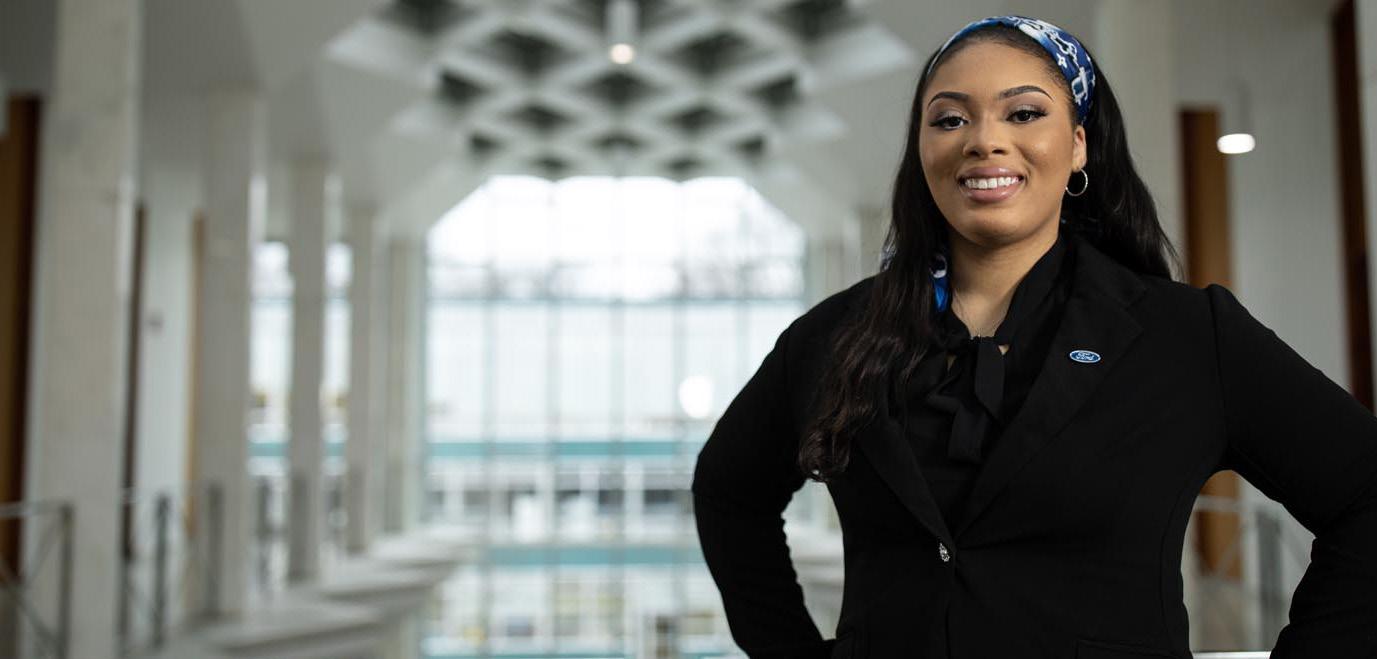
An education is about more than earning a degree — it’s about building a life. At Wayne State University, students from all backgrounds have access to a top-tier education. Here, we combine in-class learning and Detroit-powered research, internships and community service opportunities. Our students graduate Warrior Strong, ready to innovate, lead and make an impact in countless in-demand fields.
To be eligible for merit scholarships, apply by the following deadlines:
First-year fall 2025 students: April 1
Transfer fall 2025 students: June 1

Start today at wayne.edu/apply.

By Donald James Senior Writer, Real Times Media
By nature, humans are social creatures with an innate drive to communicate with others about multiple things in an array of ways at any given time. Since the 1980s and ‘90s, social media platforms – and their ever-evolving properties, technologies, and capabilities – have played significant roles in how tens of millions of people and other entities share messages, information, news, ideas, photos, videos, and other content.
For over a decade, native Detroiter Amber M. Lewis has been a power player in the progressive social media movement, making her professional mark as a digital creator and social media influencer. While both titles have been a part of the social media vernacular since at least 2006, there are some slight differences.
“There is a difference between a social
media influencer and a digital creator, but they can be used synonymously, in my opinion,” said Lewis, founder and Chief Creative Officer of Social N The City, a Detroit-based creative social media agency. “Digital creators are people who create content in general, but the content can have influence. Social media influencers act as ad agencies but have direct reach to the audiences or followers they’ve built. They influence through their lifestyle, likeness, and the content that they create.”
Like all social media influencers, Lewis has a niche or two that drives and influences followers’ opinions, behaviors, and purchasing decisions related to specific products, services, events, and more.
“My niche is lifestyle content,” Lewis explained. “Much of it is centered around marketing what’s going on in and with Detroit. However, a lot is centered on promoting Black
womanhood, which includes fashion, beauty products, and events. I am also an influencer and content creator for business grand openings and real estate developments.”
As a digital creator and social media influencer, Lewis has also left her professional fingerprints on such entities as the Michigan Economic Development Corporation, Bumble, and the City of Detroit.
Among Lewis’ many brainstorming ideas that came to social media fruition as the former director of Digital and Social Media for the City of Detroit was her “A Love Letter to Detroit” campaign and movement, where residents shared epic stories uplifting and appreciating the Motor City as an unstoppable force.
Lewis said her social media prowess comes naturally, with its roots firmly planted on Detroit’s west side, where she was raised.
“I tell people all the time that I have always been a social person,” Lewis said with a laugh. “As a kid, I got good grades, but I got 3s in citizenship because I loved talking in class. In middle school, I wanted to be a socialite when I grew up. So, as a digital creator and influencer, I’m just a reflection of who I’ve always been.”
After graduating from the Detroit School of Arts, Lewis attended Michigan State University, earning a bachelor’s degree in advertising. Her educational trek also took her to Rome and France, where she studied international advertising and public relations.
“When I was an undergraduate at Michigan State, what I do now really wasn’t an industry that was accessible outside of brands using celebrities for PR,” said Lewis. “However, I saw the potential in where social media was heading.”
Embracing the new paradigm attached to the shifting social media phenomenon, Lewis, as a professional strategist, planner, digital creator, social media influencer, and storyteller, has received kudos far beyond the Detroit City Limits. Many national news platforms, including Forbes, Huff Post, and Essence, have generated stories about her influential accomplishments associated with social media.
In mid-August 2024, Lewis was among 100 digital creators and social media industry professionals invited to the first-ever White House Creator Economy Conference, hosted by the BidenHarris Administration’s Office of Digital Strategy.
“The conference allowed members of the Administration to hear from the country’s top digital creators and influencers,” said Lewis, the Conference’s only creator and social media influencer from Detroit. “The President actually spoke to us about how we were viable sources of news.”
“You are the future,” Biden told the attendees in the White House’s Indian Treaty Room. “You are the new possibilities. You are the breakthrough in how we communicate. You are a major share of our global economy.” The future for social media influencers and digital creators is bright, with numerous niches to address, including beauty, fashion, fitness, cooking, music, education, and many more.
According to Market Research Institute International, in partnership with the University of Georgia, there are approximately 27 million paid creators in the United States, of which 44 percent are full-time. In addition, about 47 percent of creators/influencers are women. Simply put, millions are opting out of traditional career paths to work online as creators and influencers to reshape cultures and businesses in unfathomable ways.
“This industry will continue to grow,” Lewis said, adding having a college degree is not necessary to be successful. “There’s absolutely no ceiling to how high someone working as a digital creator and social media influencer can rise. At the 2024 White House Creator Economy Conference, the President and supporting reports valued the industry at $250 billion, and it’s only growing from there. Don’t be afraid to get started because there’s nothing better than getting paid to be yourself.”
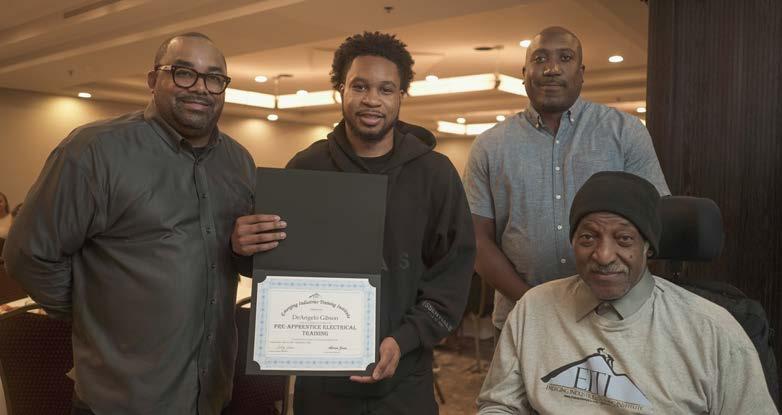
It’s never been a more exciting time to be a Detroiter looking for career and growth opportunities. As the City of Detroit’s workforce agency and a Michigan Works! agency, Detroit at Work has helped make 5000+ jobs available at any given moment, and with so many jobs readily available for Detroiters, it goes without saying how much Detroit at Work values career preparation.
How does Detroit at Work ensure career readiness?
Simply put, we are the one-stop service for a job seeker’s career preparation journey:
1. Industry-Relevant Training Programs: Our free training programs are developed in collaboration with growing industry leaders to ensure you gain skills that are high in demand. From advanced manufacturing and information technology to healthcare and construction, our courses are designed to align with current industry standards and employer expectations.
2. Comprehensive Support: Our commitment to a job seeker’s success goes beyond the classroom. Each of our nine career centers provides a range of support services, including career counseling, job placement assistance, and resume-building workshops.
We want to be sure that every Detroit job seeker receives the appropriate attention to their unique situation, which is why every Detroiter is within three miles of Detroit at Work Career Center. Our Career Center staff are experts at identifying what areas a job seeker needs assistance in to become the perfect candidate for an employer.
How does Detroit at Work topple job seeker barriers?
We have made it our mission to be a helping hand in the lives of each Detroiter. Therefore, our Career Centers assist job seekers in issues they may be facing in gaining employment. In fact, we go as far as designing our programs so that they promote healthy well-being by removing obstacles that would interfere with a job seeker’s journey. Many of our programs offer financial assistance while you earn the credentials and skills needed for an elevated career path. Without the worry of financial burden, job seekers can completely focus on their career goals.
We work to overcome factors that are beyond the control of job seekers. Someone’s age, involvement with the justice system, or a preexisting medical condition— these are example factors of what should not limit a job seeker’s career path. We understand that every job seeker’s situation is unique, so our Career Center staff builds meaningful relationships to identify what programs and services are the best fit. We take a job seeker’s personal life as seriously as their career journey, so we offer services such as expungement help, childcare assistance, health support, and many more that can be found by heading to detroitatwork.com.
Embark on a Detroit at Work Program Today!
Are you ready to take the next step in your career? There are multiple ways to get started with Detroit at Work. You can visit any one of our Career Centers, where a staff member will guide you to an appropriate service. If you prefer phone communication, you can get started with us by calling (313) 962-9675. You can also find us at detroitatwork.com, where you can view all our programs, job opportunities, Career Center locations, and career resource information. Take advantage of a Detroit at Work career opportunity today!




Amber Ogden, Staff Writer
For many high school graduates and career changers, the idea of pursuing a four-year college degree may not be the right fit. Fortunately, Metro Detroit offers a variety of vocational and technical training programs that provide direct pathways to stable, well-paying careers often in less time and at a lower cost than a traditional university education.
Many industries are in urgent need of skilled workers, and vocational schools in Metro Detroit are stepping up to fill the gap. From automotive technology to construction trades, these programs offer handson training and real-world experience, preparing students for careers in high-demand fields but with fair pay.
Wayne County Community College District (WCCCD) provides a range of career-focused programs designed to equip students with the technical skills necessary for employment in growing industries. Programs such as automotive service technology, Aviation Systems Technology program, graphic design technology, and manufacturing technology allow students to gain practical knowledge that directly translates to the workforce.
For example, the automotive service technology program prepares students for careers in vehicle diagnostics and repair, an essential role that is in high
demand in Metro Detroit’s auto industry. The aviation technology program, meanwhile, provides training in aircraft maintenance, addressing a nationwide shortage of aviation mechanics, especially with the need for air traffic controllers.
Schoolcraft College in Livonia offers hands-on training in culinary arts, salon and beauty salon management, and welding technology. These programs provide students with industry-recognized certifications and the ability to enter the workforce quickly.
The culinary arts program, for instance, is well regarded for producing highly skilled chefs who go on to work in top restaurants, catering businesses, and food service management. Meanwhile, the welding technology program trains students in metal fabrication and structural welding fields that are in high demand in construction and manufacturing.
As Metro Detroit experiences residential and commercial development growth, the demand for well-trained carpenters, electricians, and masons continues to rise. Many students completing these programs can quickly secure jobs with competitive salaries and opportunities for advancement.
One of the biggest advantages of these vocational and technical training programs is affordability. Traditional four-year college degrees often come with high tuition costs and student loan debt, whereas
vocational programs offer shorter training periods at a fraction of the cost.
Many of these programs also provide financial aid, scholarships, and partnerships with local businesses that help cover tuition costs. This makes career training an attractive option for students who want to enter the workforce sooner while avoiding significant debt. It costs in-state students $131 per credit hour for Schoolcraft College, compared to $477 on average at a four-year university like the University of Michigan.
With worker shortages in manufacturing, construction, aviation, and culinary arts, vocational training programs are more relevant than ever.
According to a May 2024 Labor and Economic Opportunity report, more than 520,000 Michigan jobs and approximately 45,500 annual openings in the professional trades are projected by the year 2030. Skilled trade jobs are among the most in-demand positions in Michigan, with high earning potential and job stability.
John Carter, a workforce development specialist at Schoolcraft College, emphasized the career stability in skilled trades and how Detroit Mayor Mike Duggan is helping to expand skilled trade accessibility.
“Michigan’s construction boom needs more skilled workers, especially in Detroit, which is driving up construction costs, so places like centers like Sachse Construction Skilled Trades are needed,” Carter said.
As a result, some projects are being completed more slowly and at a higher expense. Despite these challenges, working in construction is a promising career path, and the original vision for the city’s growth was forward-thinking.
“We’re seeing a tremendous demand for skilled workers, and these training programs are producing graduates who are ready to fill critical roles in our economy,” Carter said.
Students who complete these programs often find employment shortly after graduation, with many securing apprenticeships, internships, or full-time jobs with local businesses and major corporations. Vocational and technical training programs in Metro Detroit offer a viable and rewarding path for those seeking career opportunities without committing to a four-year degree. With affordable tuition, high job placement rates, and strong industry demand, these programs are helping to shape the future workforce while providing individuals with valuable skills and career growth opportunities.
For more information on Schoolcraft College, visit https://www.schoolcraft.edu/
For more information on Wayne County Community College District visit https://www.wcccd.edu/


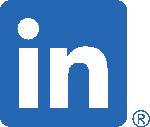


After a 10 year run, Microsoft will officially end support for Windows 10 on October 14, 2025, marking a pivotal moment for home and business users. This transition requires thoughtful planning to avoid security risks, compliance issues, and operational disruptions. Upgrading to Windows 11 offers enhanced features that can boost productivity, streamline operations, and future-proof your systems. Here’s what you need to know to prepare for this important change.
When Windows 10 reaches its end-of-life, users still relying on it will face significant challenges. Let me tell you why upgrading is essential:
No Security Updates: After October 2025, Windows 10 will no longer receive patches or updates, leaving your systems exposed to emerging cybersecurity threats like malware, ransomware, and hacking attempts. Unsupported operating systems are prime targets for cyberattacks.
Regulatory Compliance Risks: Many industries require businesses to maintain updated, secure systems to meet legal and regulatory obligations like General Data Protection Regulation (GDPR). Running unsupported software can lead to fines and reputational damage.
Operational Issues: Outdated software may struggle to run modern applications, leading to slowdowns, errors, and disruptions to daily workflows. Unsupported systems may also become incompatible with new hardware or tools critical for your operations.
Missed Opportunities: Upgrading to Windows 11 isn’t just about security. It introduces productivityenhancing features, better user experiences, and tighter integration with cloud-based tools like Microsoft 365. These improvements can give home and business users a competitive edge.
Ignoring the transition isn’t a viable option. Even if Windows 10 still “works,” it won’t stay secure or efficient as technology evolves.
Home and Business users preparing for the transition from Windows 10 have several options to consider:
1.Upgrade to Windows 11: If your current hardware meets the minimum requirements (e.g., TPM 2.0), upgrading is a straightforward and cost-effective solution. Use Microsoft’s compatibility checker to confirm and subsequently create a bootable drive for a clean install.
2.Buy New PCs: If your systems are outdated or incompatible, investing in new hardware designed for Windows 11 is a future-proof solution. This ensures your systems can support modern business needs and remain secure.
3.Extended Security Updates (ESUs): Microsoft offers ESUs for up to three years after Windows 10’s end-of-life, but these updates come at a cost. While this is a temporary solution, it’s not a longterm fix and should only be used while planning a full upgrade.
Failing to upgrade before October 2025 can lead to: Increased Security Risks: Without patches, your systems become vulnerable to cyberattacks, which can compromise sensitive data and disrupt your business.
Non-Compliance: Running unsupported software may breach regulatory standards, exposing your business to audits and penalties.
Lost Productivity: Incompatibility with modern tools and software can lead to frustrating slowdowns and work disruptions.
The cost of ignoring this transition far outweighs the time and investment needed to prepare now.
The end of Windows 10 support is an opportunity to strengthen your systems, enhance security, and embrace the future of technology. But planning ahead is key to a smooth transition.
Willie Brake is a Computer Expert and Industry Analyst at All About Technology, a Certified Disability Owned Minority Business Enterprise located at 6450 Michigan Avenue in Detroit.
4.Alternative Operating Systems (e.g., Linux): For highly technical teams, transitioning to Linux may be an option. However, this requires expertise and may not be realistic for most home and business users reliant on Windows-specific software.
All About Technology 6450 Michigan Avenue Detroit, MI 48210 (313) 218-4888
www.all-about-technology.com We













